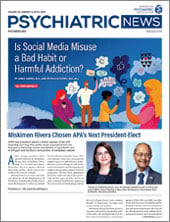Earlier this year, the movement for better mental health outcomes for athletes and entertainers took flight. “Where We Play: Nashville,” held at Belmont University’s Fisher Center, was an exploration of the mental health challenges associated with performing in the public eye hosted by the APA Foundation. It featured talent such as world champion swimmers Michael Phelps and Allison Schmitt, Grammy-nominated singers/songwriters Blessing Offor and Ashley Gorley, two-time MLB World Series champion and APA Foundation Board of Directors member Ben Zobrist, and more.
Eric Decker, a former college athlete and NFL player, told an audience of about 200 people, “After I transitioned out of football and started trying to find purpose, I think that was the hardest time of my life. I hit rock bottom and realized that my identity was so tied to sports [that] I didn’t know who I was. … The biggest answer for me was connection. Being able to share your story, share your failure, share when stuff is hard. You have to find someone to share that with.”
Altha Stewart, M.D., a former APA president and, among other positions, director of the Center for Youth Advocacy and Well-Being at the University of Tennessee Health Science Center, kicked off the event by moderating a session with Schmitt and Phelps, who shared their mental health struggles and approaches to self-care. Offor, Drew Baldridge, Sarah Kroger, and Britt Nicole were among the musicians who combined performances for the audience with their individual approaches to balancing their public and personal lives. Yoga instructor Chelsea Young led stretch breaks with attendees throughout the daylong event to underscore the close relationship between physical and mental health.
The APA Foundation presented a grant in the amount of $7,500 to The Refuge Center, which offers affordable, professional counseling services to those in need in the greater Nashville area. Refuge Center counselor Pike Williams, L.M.F.T., joined the incoming president of the Tennessee Psychiatric Association, Michelle Cochran, M.D., for a panel discussion about the challenges faced by athletes and musicians (such as performance anxiety, substance use, the decision to compete after recovering from an injury, social media, and burnout). They discussed self-care techniques and offered guidance on when to seek professional help, given that there is no health without mental health.
“Where We Play: Nashville” is the first of several events to be held across the country by the APA Foundation, targeting young people aged 18 to 25 with messages from elite entertainers and athletes about their mental health problems and how they have overcome them, with the goal of referring young people to the APA Foundation’s
Mental Health Care Works public awareness campaign. One key takeaway of the event for young athletes and performers was to recognize oneself as being a complex, multidimensional person instead of limiting one’s identity to solely being an athlete or an entertainer.
Zobrist commented, “We are so much more than just the performance on the field. Other people might show love to you when you’re performing well, and that’s great, but you need to see that you’re loved when nothing is going well. It doesn’t matter whether you win a World Series championship or you’re SEC Player of the Year. It’s not going to fulfill, at the end of the day, that level of human need that you have to feel loved. It can’t come from the field; it has to come from within.” ■
A special thanks to APAF Board of Directors members Maureen Sayres Van Niel, M.D., and Ben Zobrist for their strategic vision and leadership in planning this event.

